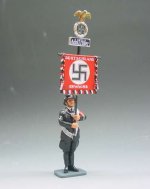NielsVV
Private
- Joined
- Jul 15, 2009
- Messages
- 30
Hello,
I am Niels from Belgium and I collect mostly only diecast tanks and action figures. Last week I've bought me my first figure from the collectors showcase.
I'll bought this one

The figure looks really superb! But after a time looking at it, I saw that Hitlers name above the flag isn't correct I guess.
Isn't it Adolf instead of Adolph? Or can someone show me a photo of this flag in real? I have also an action figure with this flag in scale 1/6 and there he's name is Adolf.
Thanks in advance
Niels
I am Niels from Belgium and I collect mostly only diecast tanks and action figures. Last week I've bought me my first figure from the collectors showcase.
I'll bought this one

The figure looks really superb! But after a time looking at it, I saw that Hitlers name above the flag isn't correct I guess.
Isn't it Adolf instead of Adolph? Or can someone show me a photo of this flag in real? I have also an action figure with this flag in scale 1/6 and there he's name is Adolf.
Thanks in advance
Niels


